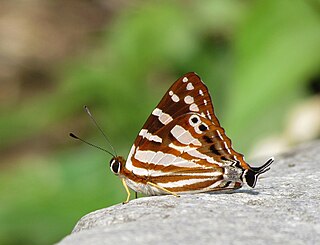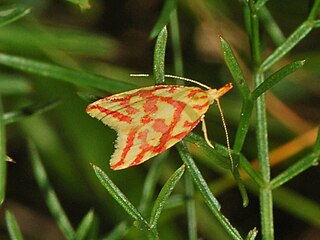
Dodona egeon, the orange Punch, is a small but striking butterfly found in the Indomalayan realm - in Mussoorie to Assam, Burma (nominate) and Peninsular Malaya that belongs to the family Riodinidae.

Ixias pyrene, the yellow orange tip, is a small butterfly of the family Pieridae, that is, the yellows and whites, which is found in Sri Lanka, India and southeast Asia.

Miletus symethus, the great brownie, is a small butterfly found in India that belongs to the lycaenids or blues family. The species was first described by Pieter Cramer in 1777.

Niphanda cymbia, the pointed Pierrot, is a small butterfly found in northern India, Burma and northern Borneo that belongs to the lycaenids or blues family.

Cethosia nietneri, the Tamil lacewing, is a species of nymphalid butterfly found in Sri Lanka and south India. The species name is after John Nietner who obtained specimens of the butterfly from Ceylon from which it was described.

Hypercallia citrinalis is a moth of the family Depressariidae. It is found in Europe, Asia Minor, Georgia, Armenia, Azerbaijan, Mongolia and southern Siberia.

Glaucocharis chrysochyta is a species of moth in the family Crambidae. This species was first described by Edward Meyrick in 1882. It is endemic to New Zealand and is found throughout the country. It inhabits native forest. Larvae appear to feed on moss and likely pupate there. Adult moths are on the wing from November to March. They fly at night and are attracted to light.

Acraea pentapolis, also known as the scarce tree-top acraea or eastern musanga acraea, is a butterfly in the family Nymphalidae. It is found in western and central Africa.
Drapetodes lunulata is a moth in the family Drepanidae. It was described by Warren in 1896. It is found in Indonesia (Java).
Hypatima isotricha is a species of moth in the family Gelechiidae. It was described by Edward Meyrick in 1921. It is found on Java in Indonesia.
Physoptila scenica is a moth of the family Gelechiidae. It was described by Edward Meyrick in 1914. It is found in southern India.
Stenoma adoratrix is a moth of the family Depressariidae. It is found in Bolivia.
Antaeotricha episimbla is a moth of the family Depressariidae. It is found in Guyana.
Stenoma epicnesta is a moth of the family Depressariidae. It is found in Guyana.
Antaeotricha bicolor is a species of moth of the family Depressariidae. It is found in Brazil.
Hypercallia alexandra is a moth in the family Depressariidae. It was described by Edward Meyrick in 1909. It is found in Peru.
Hypercallia chaldaica is a moth in the family Depressariidae. It was described by Edward Meyrick in 1913. It is found in Argentina.
Hypercallia cyathopa is a moth in the family Depressariidae. It was described by Edward Meyrick in 1913. It is found in Colombia.
Chlamydastis truncatula is a moth in the family Depressariidae. It was described by Edward Meyrick in 1913. It is found in Venezuela.
Imma ancistrota is a moth in the family Immidae. It was described by Edward Meyrick in 1912. It is found on New Guinea.







